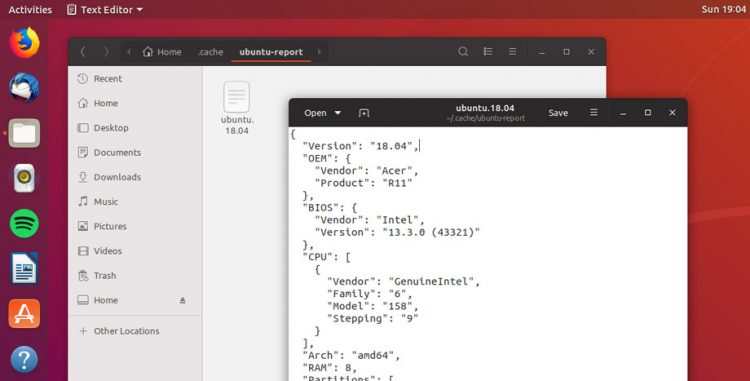Well, thanks to the doors-wide-open nature of open-source software it’s easy to find out.
It also helps that Canonical is being (unusually) upfront and open about its Ubuntu data collection policy, which is opt-out for new Ubuntu 18.04 installs, and opt-in on upgrades.
Whether you plan on making the upgrade to 18.04, or you already have (but whizzed through the Ubuntu Welcome screens without paying attention) read on to see what data Ubuntu collects, collates, and couriers back to Canonical.
Ubuntu Data Collection in 18.04
Sorry, what?!
This site was the first to report on Ubuntu’s plans to gather system metrics from new installs of 18.04 LTS.And I’ll be honest: when I first came across the plan (surreptitiously via a code commit, in case you’re curious) I was worried.
Worried not about what Canonical had plans to do, and more about the reaction those plans would generate among its (seemingly many) critics.
Memories of the Ubuntu Spyware debacle still linger
Accordingly, when Canonical did go public with its wont to collect
system data on new and existing Ubuntu installs, a fair bit
of consternation greeted the news.It seems memories of the “Ubuntu Spyware” debacle clearly still linger.
But it’s not fair; the anodyne Ubuntu Report tool in Ubuntu 18.04 is far removed from the aforementioned meta-data munching mis-step.
For unlike the Unity Dash the Ubuntu Report tool isn’t a privacy-invading tentacle, and it doesn’t grope your system search habits for the purpose of serving you pointless shopping suggestions.
It’s actually pretty dull.
Thankfully for my nerves (and no doubt the bods over at Canonical HQ) the majority of Ubuntu users were okay with the intentions – a bit of anonymous system stat profiling isn’t a major cause for concern — plus we’re told the metrics will help improve Ubuntu.
Canonical plans to publish the results of the data online for anyone to see
Even better: Canonical plans to publish the results of the data online for anyone to see (though, according to a recent mailing list post, this won’t be anytime soon).Ubuntu Report – What Data Does It Collect?
Back to Ubuntu Report.A check box to opt-out of sending info about your system to Canonical is part of the new first-run tool.
This tool, called “Ubuntu Welcome” greets all Ubuntu users, fresh installs and upgrades alike, the first time they login to Ubuntu 18.04 LTS:

This “Help Improve Ubuntu” page reads:
“Ubuntu can report information that helps improve it. This includes things like the computer model, what software is installed, and the approximate location you choose.”By default the box to opt-in is selected (“Yes, send system info to Canonical”) but you can easily opt-out (“No, don’t send system info”) should you wish to carry on computing in private.
Placing the “opt out” toggle in the Ubuntu Welcome app is the right idea.
Firstly, I’m generally impatient when I install Ubuntu. I speed-run through whatever screens are put before me in the vain hope of reaching “now installing” screen as soon as humanely possible. If the toggle had opt-out had been in Ubiquity (as initially planned) i’d have missed it.
Secondly, not everyone who uses Ubuntu installs Ubuntu. You can buy laptops pre-loaded with Ubuntu, pre-prepared devices are loaned to siblings, and so on.
Allowing the user and not the installer to decide whether system data is sent out into the digital ether is to be commended.
My System Data Report
It’s important to stress that, according to Canonical, no user-identifiable data is collected or sent to them. No account user names, no Ubuntu Single Sign-on details, no IP addresses.The “report” from my system logged details about:
- Ubuntu version
- OEM/Manufacturer
- Device model number
- BIOS info
- CPU details
- GPU details
- Installed RAM
- Partition Info
- Display(s) details
- Auto-login status
- Live Patching status
- Desktop environment
- Display server
- Timezone
Keeping the remit tight means no-one can attribute a system report to any person in particular.
With personal data outside the scope of the tool there’s precious little reason why you wouldn’t want to take part.
After all, by learning more about the hardware and systems we all Ubuntu developers can, in theory, prioritise fixes, support and development accordingly.
Ubuntu learning from its user base.
Will you take part in this Ubuntu system diagnostic reporting? Do you have concerns over the data being collected? Let us (and other readers) know in the comments below.
https://www.omgubuntu.co.uk/2018/05/this-is-the-data-ubuntu-collects-about-your-system


Không có nhận xét nào:
Đăng nhận xét